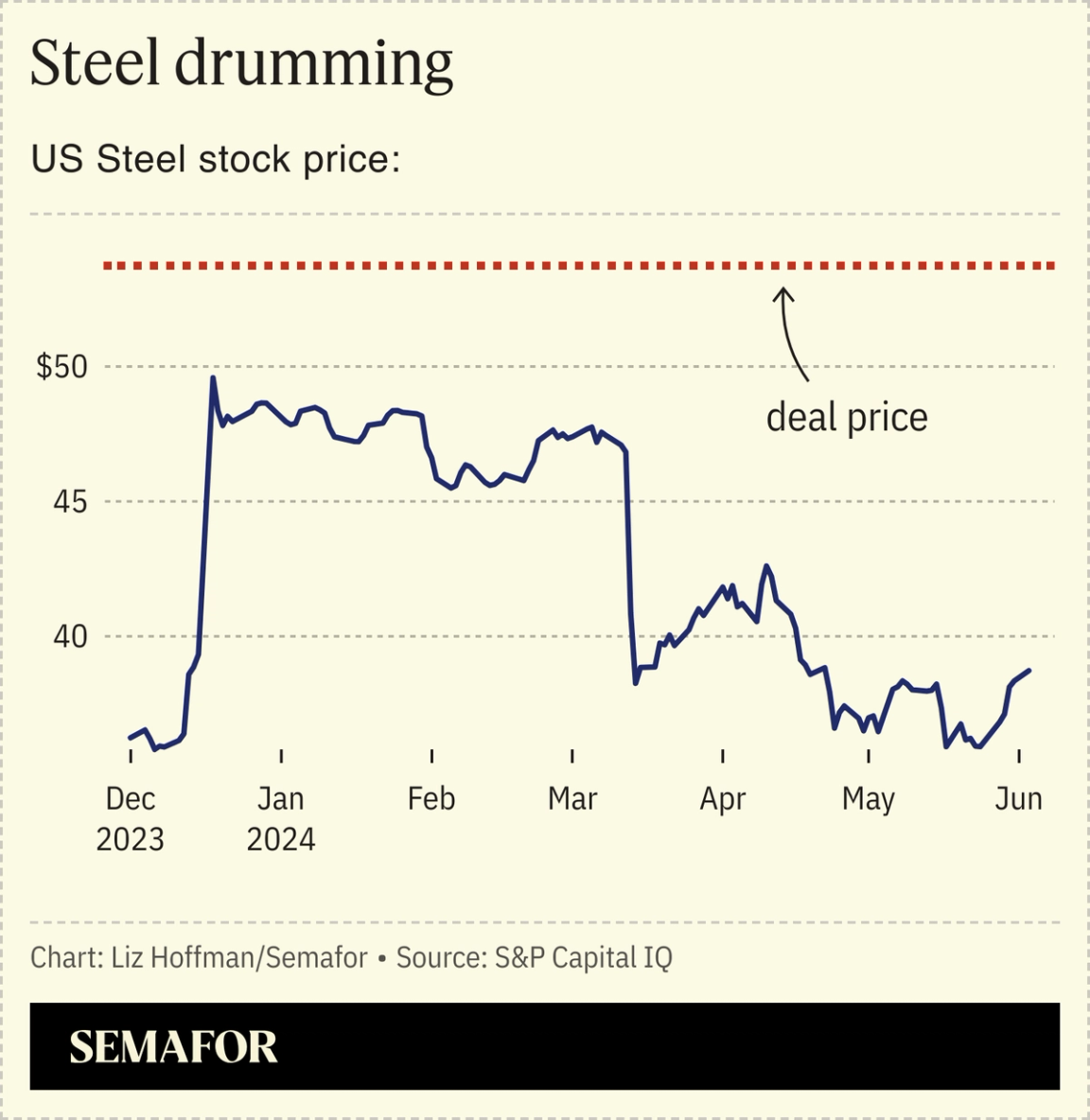THE NEWS A Nippon Steel executive says a political decision to block his company’s takeover of US Steel would be a “nightmare” for unionized workers, leaving them vulnerable to a takeover by an American rival that would “slice down” the faded giant. “I don’t think it’s going to be happy for US Steel and happy for its workers and happy for the United States as a whole,” Takahiro Mori said this week in an exclusive interview with Semafor in Washington, where he is pushing a $15 billion merger that faces dimming odds as the presidential election heats up. Back in the US for the second time in three weeks, Mori is meeting with lawmakers and community groups in Washington, DC and Pennsylvania to talk up the economic and security benefits of a deal that he says will create a stronger competitor to China, which has flooded global markets with less expensive steel. “The biggest risk in the steel industry today is an oversupply from China,” he said. A leaner and better-capitalized US Steel, “under the control of the US and Japan,” will be more competitive against Beijing, he said, urging a broader view of national security that prioritizes strategic realignment over stubborn retrenchment. He also carried a veiled warning about the bipartisan turn in Washington (and Brussels and New Delhi and elsewhere) toward protectionism. “Business is business and politics is politics, and Japan’s government is watching this deal,” he said. “Many business leaders are watching this deal, and many allied countries are watching also.” He stopped short of confirming that Nippon, a national champion in Japan, has asked Tokyo to apply diplomatic pressure, adding only that “we have some communication networks with the government. It’s a natural thing.” He dismissed a split-the-baby idea where US Steel might be broken up, with Nippon taking its electric furnaces and mining assets and its blast furnaces being sold to Cleveland-Cliffs, which had submitted a rival bid last fall. “I don’t have any intention to negotiate with the other company,” he said.  Ritsuko Shimizu/Reuters Ritsuko Shimizu/ReutersThe six months since the deal was announced have been a crash course for Nippon in US election-year politicking. Facing a voting public that’s deeply unhappy about the economy, Biden and Trump have made the US Steel takeover a campaign issue, both promising to block it if they win in November. “This is my first experience” with campaign-trail politics “and I hope it is the last,” Mori told Semafor. “You can’t pick the timing. This was a once-in-a-generation chance to get into this market. While we have heard many noises, it does not affect the fact that this is the best deal for the United States, and best for us, and best for workers.” He pointed to the 2011 takeover of Standard Steel, a Pennsylvania producer of steel train wheels, by another Japanese firm, Sumitomo, which is now part of Nippon. He said Nippon has invested $220 million in Standard Steel, which was losing money when Sumitomo bought it, and turned a record profit in 2022. “I understand what President Biden said and former President Trump said. But this is a growth story,” Mori said. “If they rightly understand the effects of this transaction, then I think they may change [their minds].” Investors don’t agree. US Steel stock is trading so far below the agreed price that a share bought today would deliver a 100% annualized return if the deal is completed by December.  LIZ’S VIEW This deal doesn’t threaten national security any more than the sale of Standard, which was founded in 1795 and, at the time Sumitomo bought it, was the only maker of forged steel railcar wheels in the country. Its fortunes in the 13 years since then — all but two of them under Nippon’s ownership — show what can be gained from fresh capital and know-how. Biden often says on the campaign trail, “don’t compare me to the Almighty; compare me to the alternative.” An American-owned company projecting US industrial might around the world does sound nice. But that’s no longer US Steel, which is the 27th-largest global producer. Twelve Chinese companies produced more steel than it did in 2022, and what it does make is “mostly worthless to national security,” William Greenwalt, a former deputy undersecretary of defense for industrial policy, wrote in March. Nippon is promising new cash and technology to strengthen its commercial and industrial products, like food cans and oil pipelines. Even if a steady supply of nonmilitary steel could be considered crucial, the Biden administration has welcomed foreign investors for other national priorities. Taiwan’s TSMC and South Korea’s Samsung have both received multibillion-dollar grants under the CHIPS Act to build semiconductor manufacturing plants in the US. Pennsylvania's governor weighs in from the (bike) trail. → |
| 






